Iran Top Commander Says US Will Be Expelled From Region
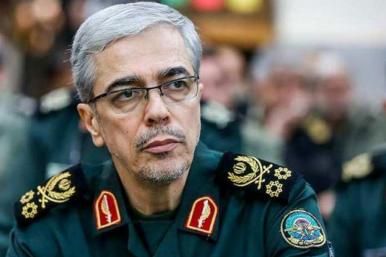
Iran’s armed forces chief of staff in an implicit threat said Tuesday that wherever there is a trace of Gen. Qasem Soleimani “things will happen” to weaken the United States and “Zionists”.

Iran’s armed forces chief of staff in an implicit threat said Tuesday that wherever there is a trace of Gen. Qasem Soleimani “things will happen” to weaken the United States and “Zionists”.
General Mohammad Bagheri, who was speaking at a gathering on the second anniversary of Soleimani’s targeted killing by the US, said, “After Gen. Soleimani’s martyrdom we witnessed how the Americans escaped from Afghanistan in humiliation and were not even able to evacuate their allies and spies.”
Bagheri added that the US is “struggling to deceptively remain in Iraq”, but they will not succeed. The Americans will also be forced to leave Syria, he said and added, “Wherever there is a trace of martyr Soleimani things happen, and we will witness the weakening of the Zionists and the Americans, thanks to the blood Soleimani shed.”
The chief of staff praised Soleimani’s role in expanding the “resistance front”, a term used by Tehran to refer to its network of proxies and allies in the region. He emphasized that before Soleimani became the commander of the Qods Force, Iran’s proxy groups did not have “even one hundredth” of their current capabilities.
Bagheri insisted that Soleimani was a soldier for Supreme Leader Ali Khamenei and carried out his orders to create forces that would weaken Israel.
Soleimani was killed by a US drone strike on January 3, 2020.
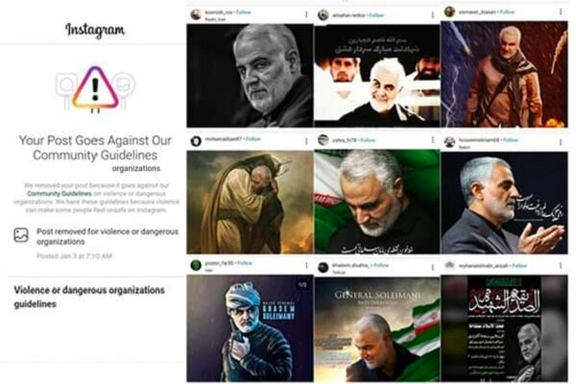
Iran has written to Mark Zuckerberg, CEO of Meta Inc. that controls Facebook and Instagram, asking why the platforms had removed posts about general Qasem Soleimani.
In a letter Reza Fazel, legal director at the telecommunications ministry, called on Zuckerberg as chief executive of Meta Platforms "to end extensive censorship" over Soleimani, who was killed alongside nine others by a United States drone attack in Baghdad on January 3, 2000.
The letter coincided with the anniversary of the general’s death, who was Iran’s top military and intelligence operator outside its borders and was in charge of supporting and organizing militant proxy forces throughout the Middle East.
A statement from the telecommunications ministry said copies of the letter had been sent to Adam Mosseri, head of Instagram, and Jessica Rosenworcel, chairwoman of the US Federal Communications Commission.
Iran itself has one of the world’s worse internet censorships, with tens of thousands of websites blocked since the early 2000s and social media platforms such as Twitter and Facebook banned.
In April 2019, Instagram deleted accounts of many current and previous Iranian Revolutionary Guards (IRGC) commanders, including Soleimani, after the US designated the IRGC a ‘foreign terrorist organization.’ When Soleimani was killed, Instagram removed photos and texts posted in praise of the Qods (Quds) Force commander.
The ministry’s letter called Soleimani "a hero in the fight against terrorism" and "eradicator of Daesh [the Arabic acronym for Isis] terrorist group.” It claimed that the deletions did not conform to any international norm and that Instagram should “respect the millions of users who hold dear this hero of the fight against terrorism, and put an end to this extensive censorship.”
The letter suggested the move had “been part of the Trump administration's psychological war against Iran," referring to former president Donald Trump, who took the decision to kill Soleimani and those travelling with him. Fazel demanded an explanation for the continuing ‘censorship’ and called for the restoration of suspended accounts and deleted posts.
President Ebrahim Raisi (Raeesi) said Monday in a televised speech that unless Trump and former secretary of state Mike Pompeo were put in trial in a “fair court” for Soleimani’s killing – which then United Nations special rapporteur Agnes Callamard dubbed unlawful – “Muslims will take our martyr's revenge.”
Supreme Leader Ali Khamenei said Saturday that “Trump and others like him” would “be forgotten and lost in the dustbin of history, albeit after paying for their crimes in this world."
Instagram, the only major social network not blocked, has around 45 million users in Iran, with a recent surveyby the Iranian Students Polling Agency (ISPA) finding 45 percent of Iranians aged 19 or older had accounts. Facebook , which is blocked in Iran, has millions of subscribers who use anti-filtering software and VPNs.
Iran’s Parliament dominated by hardliners is reviewing a bill to further restrict internet access by requiring foreign social networks and messaging applications to agree to rules set by a regulator. Those not complying would remain blocked.

Lebanese Prime Minister Najib Mikati Monday rebuked the Iran-backed Hezbollah for criticizing Saudi Arabia, saying it did not serve the national interest or represent the country's official stance.
Saudi Arabia and several other Gulf Arab states withdrew ambassadors and expelled Lebanese envoys in October and November over what the kingdom later said was arch-foe Hezbollah's dominance of the Lebanese state.
In a speech, Hezbollah leader Sayyed Hasan Nasrallah accused Saudi Arabia's king of terrorism on Monday.
"King, the terrorist is the one who has exported ... Daeshi ideology to the world, and it is you," Nasrallah said, using an acronym for Islamic State Sunni terror group.
Mikati responded in a statement, distancing himself from the Hezbollah leader.
"What ... Nasrallah said about the Kingdom of Saudi Arabia this evening does not represent the position of the Lebanese government and most Lebanese. It is not in Lebanon's interest to offend any Arab country, especially the Gulf states.
"For God's sake, have mercy on Lebanon and the Lebanese people and stop the hateful sectarian and political rhetoric."
Lebanese officials including President Michel Aoun, a Hezbollah ally, and Mikati have called for dialogue with Saudi Arabia to resolve the diplomatic crisis, which has piled onto an economic meltdown now in its third year.
Report by Reuters
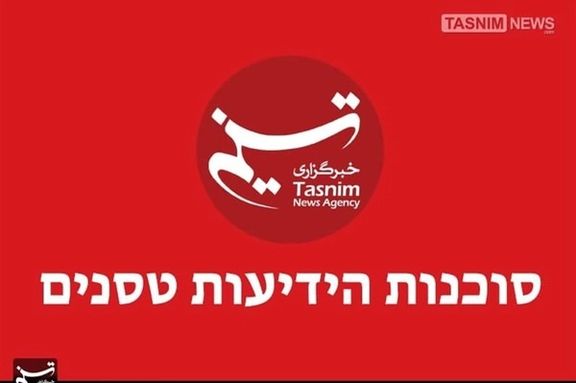
Iranian news agency Tasnim, affiliated with the Revolutionary Guard, has launched a Hebrew website on the anniversary of the targeted killing of former Qods commander Qasem Soleimani.
The CEO of the hardliner agency said in a statement on Monday that although the number of Hebrew native speakers is not so large, the agency decided to establish its Hebrew version along with its social media accounts on Twitter and Instagram because of the strategic importance of the Palestinian issue for the Islamic Republic as well as Muslims around the globe.
Majid Gholizadeh said there is “systematic censorship” on the news about Israel, noting that the Hebrew site will provide “authentic news of what is happening inside the occupied territories” to show the Israelis “the true nature and behavior of their leaders.”
Gholizadeh said the Hebrew website was unveiled on the second anniversary of Soleimani’s death to honor the commander, who “devoted his life to the efforts for the stability and calm of the nations”.
Soleimani, who was Iran’s top military and intelligence operator outside its borders, was in charge of supporting and organizing militant proxy forces. He was killed by a US drone strike in Baghdad airport in January 2020.
Nour News website, which is affiliated with the secretary of Iran's Supreme National Security Council (SNSC), Ali Shamkhani, has also set up a Hebrew version last week.
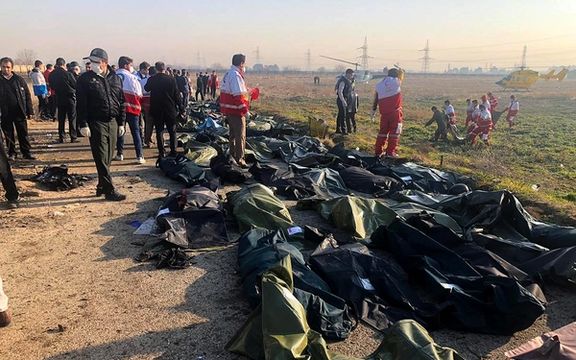
A Canadian court, which had concluded in May that the downing of a Ukrainian airliner by Iran in 2020 was deliberate, has awarded C$107 million ($84 million) to the families of six people.
Iran’s Revolutionary Guard (IRGC) shot down the Ukraine International Airlines plane on January 8, 2020, as it was taking off from the capital’s international airport. All 176 people onboard were killed, including 55 Canadian citizens and 30 permanent residents.
The six family members awarded compensation by an Ontario court lost spouses, siblings, children, nieces and nephews aboard Flight 752, their lawyer, Mark Arnold, said in a statement on Monday. They had filed a civil lawsuit against Iran and senior officials they believe were to blame for the incident.
A report by an association composed of mostly Canadian families of Flight PS752 victims in November challenged Iran's official findings that blamed a misaligned radar and an error by the air defense operator for downing the plane. Iran has not allowed any independent investigation to take place.
The lawyer said his team will look to seize Iranian assets in Canada and abroad. He said Iran has oil tankers in other countries and his team will be looking to seize whatever it can to pay what the families are owed.
The decision by Justice Edward Belobaba of Ontario's Superior Court of Justice was dated December 31 and announced by Arnold on Monday and awarded $100 million in punitive damages to be shared by the estates of the six victims. The court also awarded another $1 million to family members for the loss of guidance, care and companionship, and $6 million for pain and suffering.
Since it was a civil and not a criminal lawsuit the plaintiffs did not have to prove beyond “a reasonable doubt” that the downing of the plane was a deliberate terror act.
The case was filed by Shahin Moghaddam, Mehrzad Zarei and Ali Gorji. Fearing reprisals from Iran, some of the other plaintiffs withheld their names, CBC News reported earlier. Earlier reports had said that there are other pending court cases in Canada and in the United States.
A special Canadian forensic team had produced a report in mid-2021 that accused Iran of incompetence and recklessness over the downing of the Ukrainian passenger plane. Iran criticized the report as being "highly politicized".
Canada is not the only country seeking justice in the incident. Ukraine has been the most vocal party affected by the tragedy and has repeatedly blamed Iran for lack of cooperation in the investigation.
The report found that while the shooting down of Ukrainian International Airlines flight 752 had not been premeditated, it did not absolve Iranian officials of responsibility for the incident.
Iran admitted it shot down the airliner shortly after takeoff from Tehran in January 2020 and blamed a "disastrous mistake" by forces on high alert during a confrontation with the United States.
At the time, Iran was on edge about possible attacks after it fired missiles at Iraqi bases housing US forces in retaliation for the killing days before of its most powerful military commander, Qasem Soleimani, in a US missile strike at Baghdad airport. But authorities failed to close the civilian airspace that led to the tragedy.
With reporting by Reuters
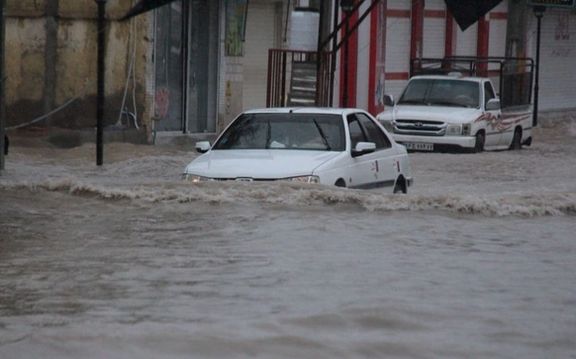
At least four people have died in flash flooding in Iran’s southern province of Fars, while rescue operations are underway in several towns and villages.
Iran’s Red Crescent Society said earlier Monday that two people were killed as flood hit many towns and villages in the southern parts of the province.
Officials of the society later added that another man lost his life and eight were rescued in an operation to save three cars that were stuck in the floods in the city of Lamard.
The deputy head of the Red Crescent in the province, Mehdi Khoubyar, said on Monday that their teams had provided relief aid to hundreds of people in the last few days.
Iranian emergency services spokesman Mojtaba Khaledi said that another victim of the floods in the province was a 50-year-old woman who drowned in the city of Darab.
Earlier on Saturday, the head of the crisis management taskforce of Hormozgan province said that an eight-year-old girl was drowned by floodwater in Bandar Abbas.
Iran’s Meteorological Organization has predicted more rains, blizzards, thunderstorms, and hails for almost all the country in the next few days, especially in southern provinces of Kerman and Hormozgan. The precipitation comes after years of drought and are not likely to alleviate the country’s water crisis.